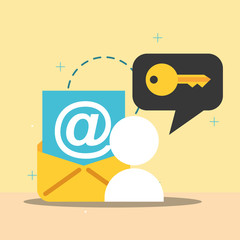Reading Time: 4 minutes
Despite the headlines almost every day about data breaches in the US and globally, we know that many businesses still rely on basic, consumer-grade security for their email systems. We also understand there are reasons for this such as cost, implementation, and user experience.
In a previous article, we examined encrypted email and why all businesses should adopt it. In this two-part series of articles, we look more closely at 5 specific types of business that have even more riding on good security practices and reputation.
1: Financial services
Along with medical service providers, financial services companies hold some of the most sensitive customer data of any business.
To ensure that financial services firms have good practices and take full accountability for the customer data they hold, US businesses in this sector are bound by the Gramm-Leach-Bliley Act. This law mandates financial services businesses to communicate with their customers regarding how their personal information is stored, protected, and shared. The Act also provides a detailed approach as to how a financial institution’s clients must be notified of any data breach. Failure to abide by the act’s strict guidelines can result in fines of up to $100,000 for non-compliance.
Outside of the GLBA, firms in this sector also have to consider Financial Industry Regulatory Authority mandates, some of which detail particular requirements for email correspondence. This regulation stipulates that financial institutions keep records of all electronically transmitted messages for at least three years. And most importantly in the context of email security, it also mandates organizations to protect all devices and systems to a documented standard – including email systems.
2: Medical and healthcare organizations
From the smallest clinic or dentist to the largest healthcare institutions in the US, all health-related service organizations need to hold a range of data on patients’ lives and health. For physicians, private clinics, opticians, funeral directors, and everything in between, safeguarding this data is not only good practice but a legal requirement.
The Health Insurance Portability and Accountability Act (HIPAA) compels organizations that fall under its sphere to uphold stringent measures designed to protect sensitive patient data. Healthcare businesses that do not meet these standards can be culpable for fines of around $50,000. In addition to the protection of patient data, the regulation also encompasses the governance of email communication, and the security of the email environment messages are sent from.
For financial institutions and healthcare organizations, the implementation of an effective email encryption service can ensure GLBA and HIPAA regulatory compliance, in addition to broader benefits such as avoidance of fines and upholding reputation.
In our next article, we will look more closely at how encrypted email can help legal and education firms, in addition to a broader range of small businesses.
Find out more
Email encryption has a reputation for being a pain to use. You have to create an account, download and install an app or plugin, open the app, sign in, and finally create and send their message. Then the recipient on the other end has to repeat all the same steps just to read the message. In a highly regulated environment such as finance and medical organizations, this complexity can be exacerbated even further.
Read more about our encrypted email solutions and how they can help your business.
Post Views: 589









